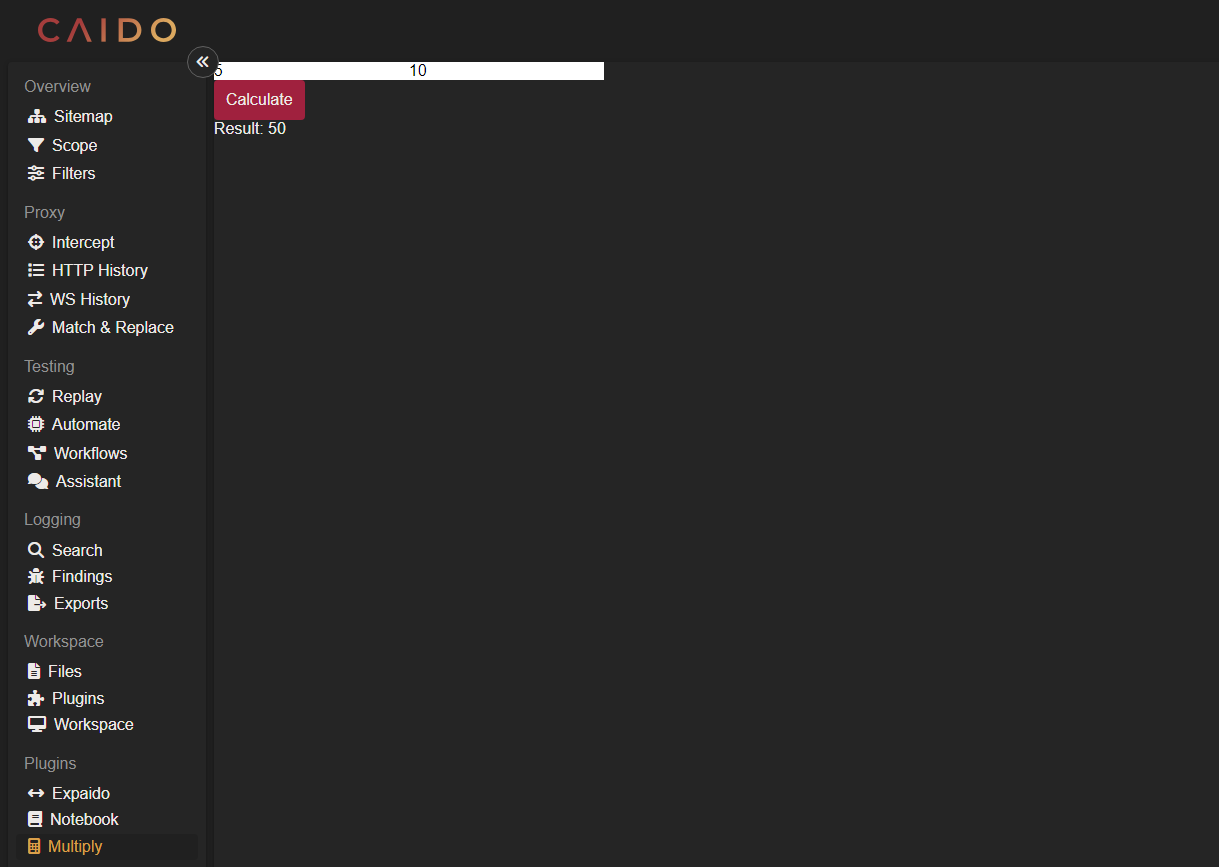Creating a Custom Endpoint
When developing a plugin, there are two components to consider: the frontend and the backend.
In this guide, we'll cover how to create a custom API endpoint in a backend plugin, and call it from a frontend plugin.
TIP
For additional documentation on the differences between a frontend and backend plugin - click here.
Registering an API Endpoint
Let's start by creating an API endpoint called multiply in our backend plugin.
multiply will take two numbers, output the result in the backend logs, as well as return the result. This endpoint will used by the frontend later on.
/packages/backend/src/index.ts
import { SDK, DefineAPI } from "caido:plugin";
function multiply(sdk: SDK, a: number, b: number) {
const result = a * b;
sdk.console.log(`The product of the multiply call is: ${result}`);
return result;
}
export type API = DefineAPI<{
multiply: typeof multiply;
}>;
export function init(sdk: SDK<API>) {
sdk.api.register("multiply", multiply);
}Script Breakdown
First, the necessary type aliases are imported. SDK is the interface used to interact with Caido. DefineAPI is used to structure the API: definining what methods or endpoints are available, the parameters those methods accept and what types of values they return.
import { SDK, DefineAPI } from "caido:plugin";Next, the function is defined. The function takes three parameters: sdk, a and b. The sdk parameter is typed using the SDK alias to give the function access to its utilities. The a and b parameters are expected to be numbers as this function multiplies the two together.
function multiply(sdk: SDK, a: number, b: number) {
const result = a * b;
sdk.console.log(`The product of the multiply call is: ${result}`);
return result;
}Using the DefineAPI utility, we are stating what our API offers. In this case, the multiply function is available to be called. To ensure the function receives the expected parameter data types, typeof is used to link the multiply API call to the multiply function definition. This definition is stored in the type alias API and exported so it can be used in other files.
export type API = DefineAPI<{
multiply: typeof multiply;
}>;Next, we define a function that will run as soon as Caido loads the plugin. It extends upon the base SDK by adding the <API>. In order to register the function, we use the sdk.api.register() method which takes two parameters: a string name for the function and the function it refers to. We give the name "multiply" to the multiply function.
export function init(sdk: SDK<API>) {
sdk.api.register("multiply", multiply);
}Calling the API Endpoint
Now that we've created our endpoint in the backend plugin, we can call multiply from our frontend plugin.
/packages/frontend/src/index.ts
import type { Caido } from "@caido/sdk-frontend";
import type { API } from "../../backend/src/index.ts";
export type CaidoSDK = Caido<API>;
const createPage = (sdk: CaidoSDK) => {
const resultText = document.createElement("p");
resultText.textContent = "Result will appear here.";
const inputA = document.createElement("input");
inputA.type = "number";
inputA.value = "0";
inputA.style.color = "black";
const inputB = document.createElement("input");
inputB.type = "number";
inputB.value = "0";
inputB.style.color = "black";
const calculateButton = sdk.ui.button({
variant: "primary",
label: "Calculate",
});
calculateButton.addEventListener("click", async () => {
const a = Number(inputA.value);
const b = Number(inputB.value);
const result = await sdk.backend.multiply(a, b);
resultText.textContent = `Result: ${result}`;
});
const container = document.createElement("div");
container.appendChild(inputA);
container.appendChild(inputB);
container.appendChild(calculateButton);
container.appendChild(resultText);
const card = sdk.ui.card({
body: container
});
sdk.navigation.addPage("/multiply-page", {
body: card
});
}
export function init(sdk: CaidoSDK) {
createPage(sdk);
sdk.sidebar.registerItem("Multiply", "/multiply-page", {
icon: "fas fa-calculator"
});
}Script Breakdown
Again, we need to import the necessary type aliases: the base SDK and the API we just defined in the backend.
import type { Caido } from "@caido/sdk-frontend";
import type { API } from "../../backend/src/index.ts";Next, we add the API to the SDK by creating the CaidoSDK type alias.
export type CaidoSDK = Caido<API>;The page will include two input fields, one for each expected number parameter and a <p></p> tag that will be used to display the result.
TIP
For additional documentation on creating a page - click here.
const createPage = (sdk: CaidoSDK) => {
const resultText = document.createElement("p");
resultText.textContent = "Result will appear here.";
const inputA = document.createElement("input");
inputA.type = "number";
inputA.value = "0";
inputA.style.color = "black";
const inputB = document.createElement("input");
inputB.type = "number";
inputB.value = "0";
inputB.style.color = "black";The page also includes a button, that when clicked will take the supplied input and use the values as the parameters for the multiply function which is called using sdk.backend.multiply(a, b);. To account for processing time, await is used.
const calculateButton = sdk.ui.button({
variant: "primary",
label: "Calculate",
});
calculateButton.addEventListener("click", async () => {
const a = Number(inputA.value);
const b = Number(inputB.value);
const result = await sdk.backend.multiply(a, b);
resultText.textContent = `Result: ${result}`;
});The page elements are all grouped together and stored in the container variable which is then used as the body property value of the sdk.ui.card({}) method. The page is then added to Caido using the sdk.navigation.addPage() method with the path of "/multiply-page". Its content is the card we just defined.
const container = document.createElement("div");
container.appendChild(inputA);
container.appendChild(inputB);
container.appendChild(calculateButton);
container.appendChild(resultText);
const card = sdk.ui.card({
body: container
});
sdk.navigation.addPage("/multiply-page", {
body: card
});
}Finally, we define an initialization function for the frontend that will generate this page when Caido loads our plugin. The sdk.sidebar.registerItem() method will add a tab for our plugin page to the left-hand side menu of Caido named Multiply with a calculator icon.
export function init(sdk: CaidoSDK) {
createPage(sdk);
sdk.sidebar.registerItem("Multiply", "/multiply-page", {
icon: "fas fa-calculator"
});
}The Result

The entry to your Caido log file should resemble:
2024-11-05T13:26:13.528023Z INFO plugin:5a758b74-e176-473f-a545-bdb452015b9a js|sdk: The product of the multiply call is: 15